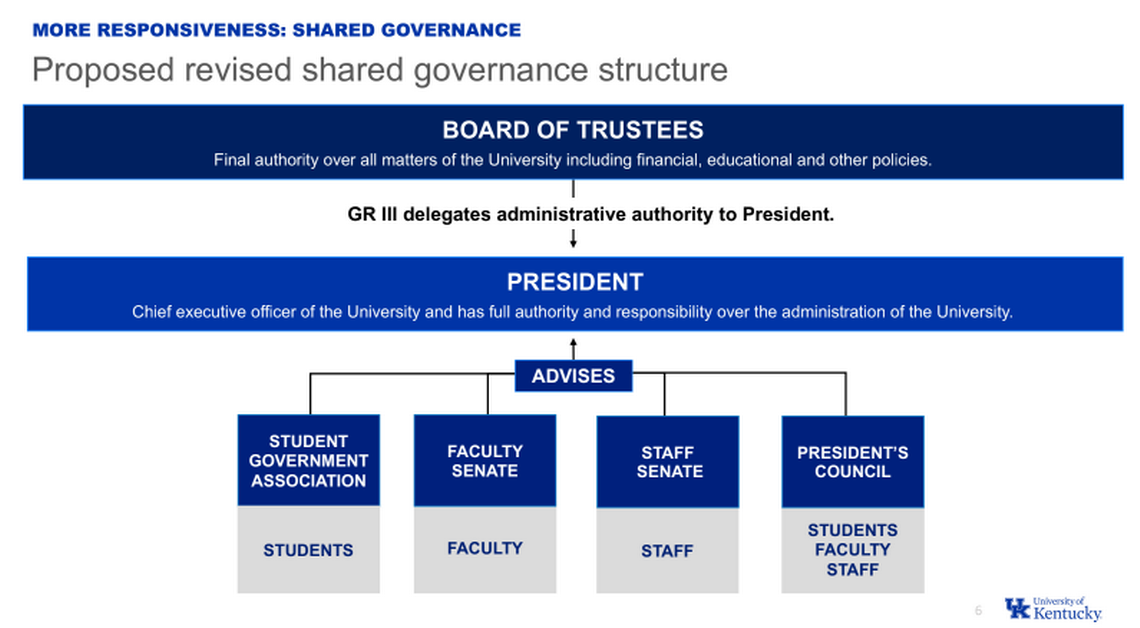UK votes to dissolve university senate, strips role of helping set school policies
The University of Kentucky’s university senate will be dissolved and moved into an advisory role, changing its role in setting school policies, the board of trustees voted on Friday.
The decision comes after two months of debate and objections from faculty, though student and staff groups support the changes. Faculty members have said they worry about the long-term implications of making the university senate an advisory body, with hundreds of faculty attending the Friday morning meeting. Nine people spoke before the board in opposition of the proposed changes, while five people spoke in favor of it. Three of the supporting five were college deans.
President Eli Capilouto presented the new governance structure to the board of trustees, which moves the university senate, established in 1917, from a policy-making body to an advisory faculty senate. The Student Government Association and the staff senate would remain as advisory bodies at UK.
Capilouto said the time to make changes was now, in order to be able to change and evolve. Capilouto said he’d heard from staff and students throughout this process, who said they often felt left out of the decision-making process at the university.
“Change can be uncomfortable. That’s why they’re called growing pains,” Capilouto said. “But if we are to live up to our promise and to our potential, we must be willing to evolve with the world around us.”
Faculty members told the board they wanted to bring more student and staff voices into decision-making, but opposed the process used to propose changes to the board.
“This is institutional betrayal and this president and the board of trustees, except Trustee Swanson, have not upheld their fiduciary responsibility,” said DeShana Collett, chair of the senate council. “It has been clear that they do not intend to do anything opposing the president, their only employee.”
Change to UK governing regulations
In addition to changes to the senate, the board also approved a slate of changes to the university’s governing regulations, which lay out how the university operates and what authority is given to the president, board of trustees and other university bodies.
“Throughout my conversations with more than a thousand community members, it has become abundantly clear that all of us care deeply about this community and the way we accomplish our goals,” Capilouto said. “I believe this is the right time to make a sustainable change. I believe we are the right community for this work.”
The university’s governing regulations have existed since the third president, Frank McVey. Governing regulations have not seen major changes proposed since the early 2000s, when the university moved to its current organizational structure. Prior to that, administrative regulations also saw changes in the mid-1960s, said UK spokesperson Jay Blanton.

The proposed changes were approved nearly unanimously, with one faculty trustee, Hollie Swanson, voting against.
“The faculty do not fear change. We encounter change every day in our academic work,” Swanson said. “We do fear loss — loss of our voice and and loss of quality of education currently being offered here at the University of Kentucky.”
The other faculty trustee, Hubie Ballard, said he’d heard support from faculty members for the resolution, and voted in favor. Other board members said they supported the proposal because it elevated the role of students and staff.
“I’m very disappointed with the results,” said history professor Karen Petrone. “I know the faculty absolutely agree that there should be meaningful student voices and meaningful staff voices at the table. But the problem is that the new structure makes everyone advisory, and no one has the decision making policy power that is necessary. ... This is a loss for everyone.”
Capilouto’s proposal was sent to the board, faculty, staff and students last Friday. Both the Student Government Association and the staff senate passed resolutions supporting the proposal, while the university senate has passed multiple resolutions opposing the changes.
“The bottom line is that what (Capilouto) heard — and what I heard as well — is that too many members of our community, particularly students and staff and those at the local unit level, don’t feel as though they have a voice,” said Board Chair Britt Brockman. “They don’t see themselves as having a seat at the table in the decisions that are made about the University, whose progress and promise is our joint project. It is our shared responsibility, but that implies actually sharing in it.”
With the university senate moving into an advisory role, items that the senate currently oversees, like new courses, curriculum or academic programs, will instead be approved by departments or colleges, then the provost, before going to the board for approval.
William Taylor, a UK senior, said they felt the changes meant “no checks and balances” at the university.
“We made recommendations for better representing students and staff by adding them to the existing senate with voting rights. It was pretty much ignored and not considered,” Taylor said.

At the February board meeting, trustees gave Capilouto the authority to recommend changes to the university’s governing regulations. Since then, the university senate and senate council, which has authority to create broad education policy and academic standards for UK, has passed multiple resolutions calling on Capilouto to slow the process and delay making a recommendation to the board.
Capilouto has said the change is needed to make the university “more nimble,” and would align the university’s structure with more common governance models.
